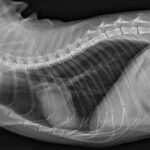Kennel cough is an infectious bronchitis of dogs characterized by a harsh, hacking cough that most people describe as sounding like “something stuck in my dog’s throat.” This bronchitis may be of brief duration and mild enough to warrant no treatment at all or it may progress all the way to a life-threatening pneumonia depending on which infectious agents are involved and the immunological strength of the patient. An uncomplicated kennel cough runs a course of a week or two and entails frequent fits of coughing in a patient who otherwise feels active and normal. Uncomplicated cases do not involve fever or listlessness, just lots of coughing.
Numerous organisms may be involved in a case of kennel cough; it would be unusual for only one agent to be involved. Infections with the following organisms frequently occur concurrently to create a case of kennel cough:
Bordetella bronchiseptica (bacteria)
Parainfluenza virus
Adenovirus type 2
Canine distemper virus
Canine influenza virus
Canine herpesvirus (very young puppies)
Mycoplasma canis (a single-cell organism that is neither virus nor bacterium)
Canine reovirus
Canine respiratory coronavirus.
Kennel Cough Treatment in The Houston Heights
An uncomplicated case of kennel cough will go away by itself. Cough suppressants can improve patient comfort while the infection is resolving. The dog should be clearly improved, if not recovered, after about a week. That said, several infectious agents in the kennel cough complex are more intense and can cause a minor bronchitis to progress to pneumonia, which is a potentially life-threatening disease. Given this possibility, antibiotics are frequently prescribed to kennel cough patients to prevent or curtail pneumonia before it warrants hospitalization.
It is important to distinguish an uncomplicated case of kennel cough from one complicated by pneumonia for obvious reasons. The uncomplicated cases will not have fever or appetite loss and they will not be listless. As mentioned, they will seem normal except for coughing. Dogs with pneumonia appear sick.
Prevention Through Vaccination in The Houston Heights
Vaccination is only available for: Bordetella bronchiseptica, canine adenovirus type 2, canine parainfluenza virus, canine distemper, and canine influenza. Infections with other members of the kennel cough complex cannot be prevented. Vaccine against adenovirus type 2, parainfluenza, and canine distemper is generally included in the basic puppy series and subsequent boosters (the DHPP or distemper-parvo shot). For Bordetella bronchiseptica, vaccination can either be given as a separate injection or as a nasal immunization. There is some controversy regarding which method provides a better immunization or if a combination of both formats is best.



